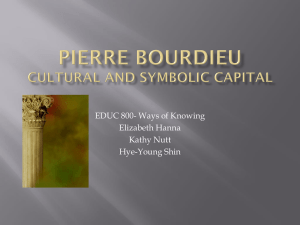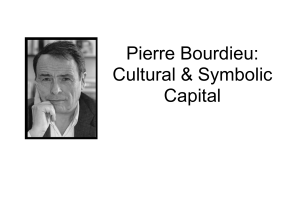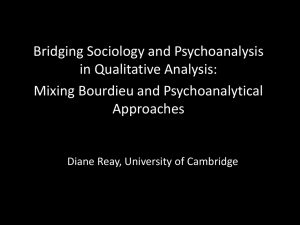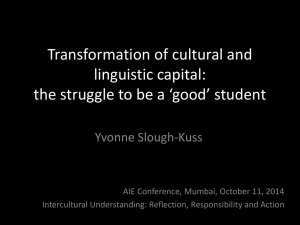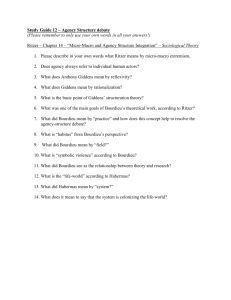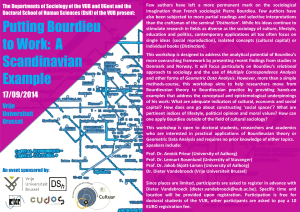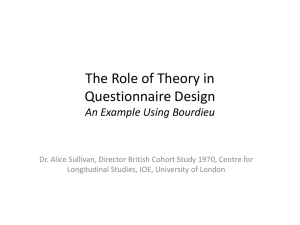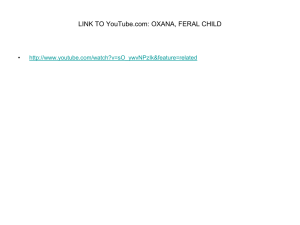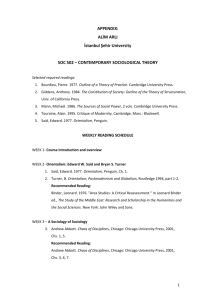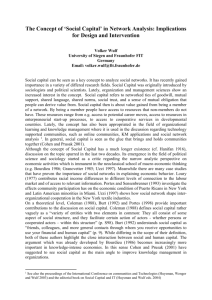Graduate Seminar/ Spring 2015
advertisement
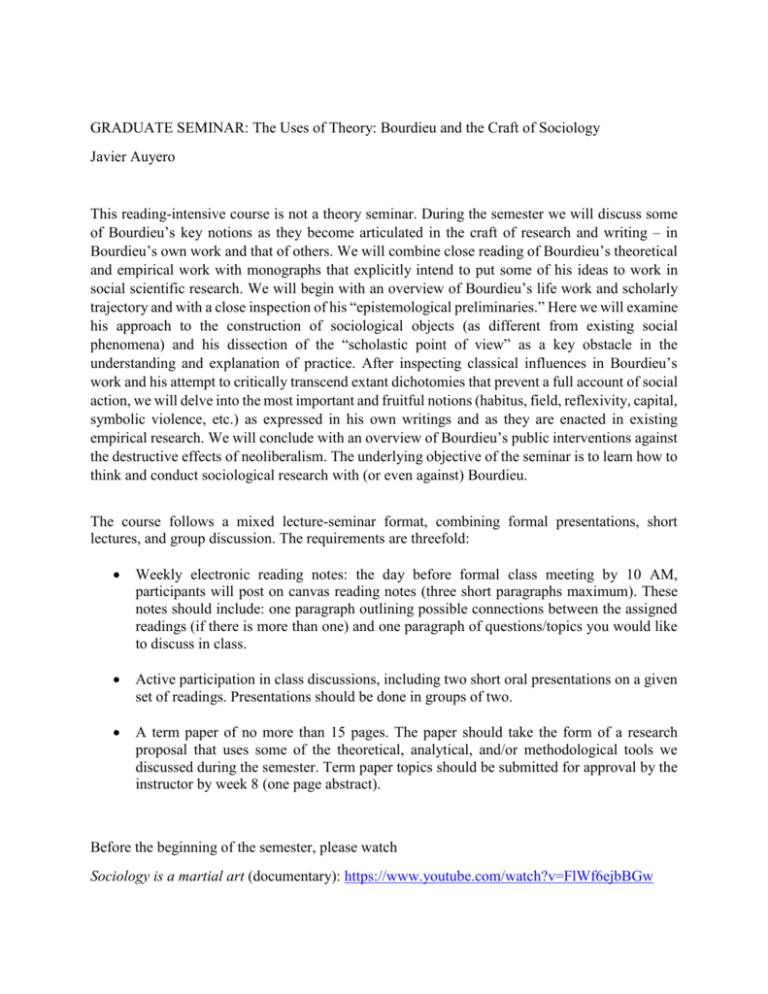
GRADUATE SEMINAR: The Uses of Theory: Bourdieu and the Craft of Sociology Javier Auyero This reading-intensive course is not a theory seminar. During the semester we will discuss some of Bourdieu’s key notions as they become articulated in the craft of research and writing – in Bourdieu’s own work and that of others. We will combine close reading of Bourdieu’s theoretical and empirical work with monographs that explicitly intend to put some of his ideas to work in social scientific research. We will begin with an overview of Bourdieu’s life work and scholarly trajectory and with a close inspection of his “epistemological preliminaries.” Here we will examine his approach to the construction of sociological objects (as different from existing social phenomena) and his dissection of the “scholastic point of view” as a key obstacle in the understanding and explanation of practice. After inspecting classical influences in Bourdieu’s work and his attempt to critically transcend extant dichotomies that prevent a full account of social action, we will delve into the most important and fruitful notions (habitus, field, reflexivity, capital, symbolic violence, etc.) as expressed in his own writings and as they are enacted in existing empirical research. We will conclude with an overview of Bourdieu’s public interventions against the destructive effects of neoliberalism. The underlying objective of the seminar is to learn how to think and conduct sociological research with (or even against) Bourdieu. The course follows a mixed lecture-seminar format, combining formal presentations, short lectures, and group discussion. The requirements are threefold: Weekly electronic reading notes: the day before formal class meeting by 10 AM, participants will post on canvas reading notes (three short paragraphs maximum). These notes should include: one paragraph outlining possible connections between the assigned readings (if there is more than one) and one paragraph of questions/topics you would like to discuss in class. Active participation in class discussions, including two short oral presentations on a given set of readings. Presentations should be done in groups of two. A term paper of no more than 15 pages. The paper should take the form of a research proposal that uses some of the theoretical, analytical, and/or methodological tools we discussed during the semester. Term paper topics should be submitted for approval by the instructor by week 8 (one page abstract). Before the beginning of the semester, please watch Sociology is a martial art (documentary): https://www.youtube.com/watch?v=FlWf6ejbBGw Week one: Epistemological and Methodological Preliminaries (In this order) “Pierre Bourdieu” by Loïc Wacquant “Remembering Pierre Bourdieu,” by Craig Calhoun. In Sociology is a Martial Art. Gisele Sapiro (ed.) Introduction to Reflexive Sociology, pp. 1-59 The Craft of Sociology, pp. 1-71 Recommended: “Pierre Bourdieu in Context,” by Craig Calhoun. “Rethinking Classical Theory: The Sociological Vision of Pierre Bourdieu” by Rogers Brubaker. 1985. Theory and Society 14, 745-75. Week two: Habitus - Body The Logic of Practice, chapters 1, 2, 3. Body and Soul by Loïc Wacquant 3-149. Recommended: “Carnal Connections: On Embodiment, Apprenticeship, and Membership,” by Loïc Wacquant. Qualitative Sociology 28(4):445-474. Week three: Habitus – Forming, Transforming. “Embodying the Faith: Religious Practice and the Making of a Muslim Moral Habitus,” by Daniel Winchester. Social Forces 86(4): 1753-1780 On the Fireline by Matthew Desmond, entire. Recommended: “Habitus, Field, and Capital” by Craig Calhoun in Bourdieu: Critical Perspectives. “Making the Economic Habitus. Algerian Workers Revisited.” Ethnography 1 (1): 17-41 Week four: Social Space and Power “Social Space and Symbolic Power,” in In Other Words. "What Makes a Social Class? On the Theoretical and Practical Existence of Groups," Berkeley Journal of Sociology, 32 (1987): 1-18. Distinction Part I, Part II (2 and 3), Conclusion: Classes and Classifications Week Five: Inequality and Reproduction “Cultural Reproduction, Social Reproduction.” State Nobility (Foreword by Loïc Wacquant, Prologue, Part I 7-47) Learning to Labor, by Paul Willis (entire) Week Six: Capitals “The Forms of Capital.” In J. Richardson (Ed.) Handbook of Theory and Research for the Sociology of Education, 241-258. Unequal Childhoods, by Annette Lareau (entire) Recommended: Pricing Beauty: The Making of a Fashion Model by Ashley Mears (entire). Week Seven: Fields The Field of Cultural Production (editor’s Introduction, “The Field of Cultural Production, or: The Economic World Reversed”) “Political Representation: Elements for a Theory of the Political Field.” Chapter 8 in Language and Symbolic Power, pp. 171-202. Shaping Immigration News by Rodney Benson Recommended: Think Tanks in America by Thomas Medvetz; The Good Project. Humanitarian Relief NGOs and the Fragmentation of Reason by Monika Krause Week Eight: Domination Masculine Domination (entire) Patients of the State by Javier Auyero (entire) Recommended: Mema’s House by Annick Prieur Week Nine: Symbolic violence Language and Symbolic Power (Editor’s Introduction, “The Production and Reproduction of Legitimate Language,” pp. 105-116, “On Symbolic Power”) “Symbolic Violence and Political Struggles,” Chapter 5, Pascalian Meditations. Fresh Fruit, Broken Bodies: Migrant Farmworkers in the United States by Seth Holmes (entire). Week Ten: Reflexivity-Understanding “Understanding,” in The Weight of the World. “The Scholastic Point of View,” Cultural Anthropology 5 (4): 380-91. “Participant Objectivation: The Huxley Medal Lecture,” Journal of the Royal Anthropological Institute, 9-2: 281-294. “A Lecture on the Lecture,” in In Other Words. Week Eleven: Social Suffering - Interventions “Social Being, Time and the Sense of Existence,” Chapter 6, Pascalian Meditations. Selections from The Weight of the World: “The Space of Points of View,” “Jonquil Street,” “Hanging by a Threat,” and “A Silent Witness” Selections from Sociology is a Martial Art, edited by Gisele Sapiro: “For a scholarship with commitment,” “The Left Hand and the Right Hand of the State,” “Job Insecurity is Everywhere Now,” and “Neo-Liberalism: The Utopia (Becoming a Reality) of Unlimited Exploitation.” Week Twelve: The State “Rethinking the State: On the Genesis and Structure of the Bureaucratic Field.” Sociological Theory 12 (March): 1-19 On the State (selections TBA)
